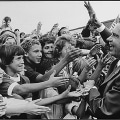As an expert in political campaigns and communication, I have seen firsthand the impact of social media on engaging voters in Southeast Texas. With the rise of platforms like Facebook, Twitter, and Instagram, candidates now have a powerful tool to reach potential voters and spread their message.
The Importance of Social Media in Candidate Campaigns
Social media has become an essential part of modern political campaigns. It allows candidates to connect with voters on a more personal level, share their platform and policies, and respond to current events in real-time. In Southeast Texas, where traditional campaigning methods like door-to-door canvassing and town hall meetings may not be feasible due to the large geographic area, social media provides a way for candidates to reach a wider audience. According to a study by the Pew Research Center, 72% of American adults use at least one social media platform.This means that candidates who do not have a strong presence on social media risk missing out on reaching a significant portion of potential voters. In Southeast Texas, where the population is spread out across multiple counties and cities, social media allows candidates to connect with voters regardless of their location.
How Candidates in Southeast Texas Use Social Media
Each candidate has their own unique approach to using social media in their campaign. Some may focus on one platform while others may use multiple platforms to reach different demographics. However, there are some common strategies that candidates in Southeast Texas use to engage with voters through social media.Creating a Strong Online Presence
The first step for any candidate is to establish a strong online presence.This includes creating profiles on popular social media platforms like Facebook, Twitter, and Instagram. Candidates also often have their own campaign website where they can share more detailed information about their platform and policies. Having a strong online presence not only allows candidates to reach a wider audience, but it also helps them appear more legitimate and professional. Voters are more likely to take a candidate seriously if they have a well-maintained social media presence.
Sharing Campaign Updates and Events
Social media is an excellent tool for keeping voters informed about campaign updates and events. Candidates can use platforms like Facebook and Twitter to share news articles, videos, and photos related to their campaign.They can also use these platforms to promote upcoming events like rallies, town hall meetings, and fundraisers. By regularly updating their social media profiles with campaign news and events, candidates can keep voters engaged and interested in their campaign. This also allows voters to stay informed about the candidate's platform and policies without having to attend in-person events.
Responding to Current Events
Social media allows candidates to respond quickly to current events and issues that may impact their campaign. For example, if there is a natural disaster or a major news story that affects Southeast Texas, candidates can use social media to share their thoughts and plans for addressing the situation. This real-time communication with voters helps candidates appear more relatable and responsive. It also allows them to address any concerns or questions that voters may have in a timely manner.The Impact of Social Media on Voter Engagement
So, how effective are candidate campaigns in Southeast Texas at engaging with voters through social media? According to a study by the University of Houston, social media has a significant impact on voter engagement in the region. The study found that candidates who actively use social media during their campaign are more likely to receive votes from younger voters and those who are more politically engaged.This is because social media allows candidates to reach these demographics in a way that traditional campaigning methods may not. Additionally, the study found that candidates who use social media to engage with voters are more likely to receive donations and volunteers for their campaign. This is because social media allows candidates to build a personal connection with voters, making them more likely to support the candidate's campaign.
The Future of Social Media in Candidate Campaigns
As technology continues to advance and social media platforms evolve, it is clear that social media will continue to play a significant role in candidate campaigns in Southeast Texas. With the ability to reach a wide audience, share campaign updates and events, and respond to current events in real-time, social media has become an essential tool for engaging with voters. However, it is important for candidates to use social media responsibly and ethically. With the rise of fake news and misinformation on social media, candidates must ensure that the information they share is accurate and truthful.They must also be mindful of how their posts may be perceived by different demographics and avoid alienating potential voters.






